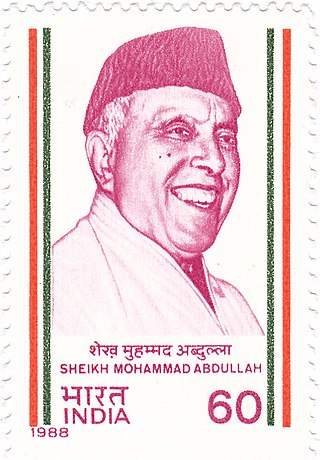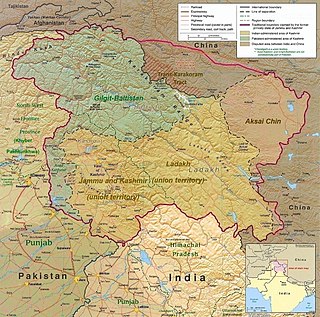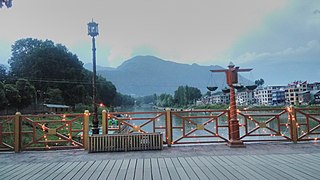
The Jammu & Kashmir National Conference (JKNC) is a regional political party in the Indian union territories of Jammu and Kashmir and Ladakh. Founded as the All Jammu and Kashmir Muslim Conference by Sheikh Abdullah and Chaudhry Ghulam Abbas in 1932 in the princely state of Jammu and Kashmir, the organisation renamed itself to "National Conference" in 1939 in order to represent all the people of the state. It supported the accession of the princely state to India in 1947. Prior to that, in 1941, a group led by Ghulam Abbas broke off from the National Conference and revived the old Muslim Conference. The revived Muslim Conference supported the accession of the princely state to Pakistan and led the movement for Azad Kashmir.

Maharaja Sir Hari Singh was the last ruling Maharaja of the princely state of Jammu and Kashmir.

Farooq Abdullah is an Indian politician who was Ex. President of Jammu & Kashmir National Conference. He has served as the Chief Minister of Jammu and Kashmir on several occasions since 1982, and as the union minister for New and Renewable Energy between 2009 and 2014. He is the son of the 1st elected Chief Minister of Jammu and Kashmir Sheikh Abdullah, and father of former Chief Minister of Jammu and Kashmir Omar Abdullah.

Omar Abdullah is an Indian politician and former Chief Minister of the erstwhile state of Jammu and Kashmir.

Sheikh Mohammad Abdullah was an Indian politician who played a central role in the politics of Jammu and Kashmir. Abdullah was the founding leader of the All Jammu and Kashmir Muslim Conference and the 1st elected Prime Minister of Jammu and Kashmir after its accession to India. He agitated against the rule of the Maharaja Hari Singh and urged self-rule for Kashmir. He served as the 1st elected Prime Minister of the Princely State of Jammu and Kashmir and was later jailed and exiled. He was dismissed from the position of Prime Ministership on 8 August 1953 and Bakshi Ghulam Mohammad was appointed the new Prime Minister. The expressions 'Sadr-i-Riyasat' and 'Prime Minister' were replaced with the terms 'Governor' and 'Chief Minister' in 1965. Sheikh Abdullah again became the Chief Minister of the state following the 1974 Indira-Sheikh accord and remained in the top slot till his death on 8 September 1982.

The insurgency in Jammu and Kashmir, also known as the Kashmir insurgency, is an ongoing separatist militant insurgency against the Indian administration in Jammu and Kashmir, a territory constituting the southwestern portion of the larger geographical region of Kashmir, which has been the subject of a territorial dispute between India and Pakistan since 1947.

The Jammu & Kashmir National Panthers Party is a socialist and secular state political party in the state of Jammu and Kashmir, India. The party was founded on 23 March 1982 by husband and wife couple Prof. Bhim Singh and Jay Mala, Its aim is to "demolish corruption, communalism, criminalization, drug menace" and to establish a real democracy through ultimate revolution. Panthers party has maintained power at assembly and local level for over four decades in its stronghold within the mountainous Udhampur constituency, where 5.9 million tonnes of lithium with an estimated value of $500 billion, was discovered in February 2023.

The Kashmir conflict is a territorial conflict over the Kashmir region, primarily between India and Pakistan, and also between China and India in the northeastern portion of the region. The conflict started after the partition of India in 1947 as both India and Pakistan claimed the entirety of the former princely state of Jammu and Kashmir. It is a dispute over the region that escalated into three wars between India and Pakistan and several other armed skirmishes. India controls approximately 55% of the land area of the region that includes Jammu, the Kashmir Valley, most of Ladakh, the Siachen Glacier, and 70% of its population; Pakistan controls approximately 30% of the land area that includes Azad Kashmir and Gilgit-Baltistan; and China controls the remaining 15% of the land area that includes the Aksai Chin region, the mostly uninhabited Trans-Karakoram Tract, and part of the Demchok sector.
The following is a timeline of the Kashmir conflict, a territorial conflict between India, Pakistan and, to a lesser degree, China. India and Pakistan have been involved in four wars and several border skirmishes over the issue.

Maqbool Bhat also spelt Maqbool Butt was a Kashmiri separatist leader who migrated to Pakistan and founded the militant group National Liberation Front (NLF), which was a precursor to the present day Jammu Kashmir Liberation Front (JKLF). Bhat carried out multiple attacks in Jammu and Kashmir (state). He was captured and sentenced to double death sentence. He was hanged on 11 February 1984 in Tihar Jail in Delhi. His body was not returned to Kashmiris.
Balraj Puri (1928-2014) was an Indian Political commentator and human rights activist.

The All Jammu and Kashmir Muslim Conference (Urdu: آل جموں و کشمیر مسلم کانفرنس) also shortly referred as Muslim Conference (MC) is a political party in Pakistan administrated territory of Azad Jammu and Kashmir. The party was founded by Chaudhry Ghulam Abbas in the former princely state of Jammu and Kashmir as a splinter group of the Jammu & Kashmir National Conference.

Jammu and Kashmir Cricket Association (JKCA) is an organisation that governs and manages cricket in the Indian union territory of Jammu and Kashmir. It fields the Jammu and Kashmir cricket team in the Ranji Trophy domestic tournament. It is a member of the Board of Control for Cricket in India.
Shameema Dev Azad is an Indian singer from Jammu and Kashmir. She is married to Ghulam Nabi Azad, former Chief Minister of Jammu and Kashmir.

The Zero Bridge is an old wooden arch bridge located in the city of Srinagar in the Indian union territory of Jammu and Kashmir. It crosses the Jhelum river in a roughly North-South direction connecting Sonwar in the north to Rajbagh in the South. Originally constructed in the late 1950s under the then prime minister Bakshi Ghulam Mohammad, the bridge was closed for vehicular traffic in the late 1980s owing to the weakening of its wooden structure.

The Lal Mandi Footbridge is a suspension-type pedestrian bridge located in the city of Srinagar in the Indian union territory of Jammu and Kashmir. It connects Wazir Bagh areas of the city to the city centre Lal Chowk.

A widespread agitation throughout the princely state of Jammu and Kashmir in British Raj occurred in 1931 against the Maharaja's government. The Maharaja was forced to appoint the Glancy Commission to investigate the people's concerns. Various political reforms were adopted including the introduction of the Jammu and Kashmir Praja Sabha. The movement also saw the rise of Sheikh Muhammad Abdullah as the leader of Kashmiris. The movement was funded by some well-to-do Muslim Zaildars and business houses.
Budshah Bridge, locally also known as Budshah Kadal, is a concrete bridge located in the Srinagar city of the Indian union territory of Jammu and Kashmir. It was first built in 1957 during the rule of Bakshi Ghulam Mohammad and is named after the 15th Century ruler of Kashmir, Zain-ul-Abidin, popularly known as Budshah.

The Jammu and Kashmir Public Safety Act, 1978 (PSA) is a preventive detention law under which a person is taken into custody to prevent them from acting harmfully against "the security of the state or the maintenance of the public order" in the Indian state of Jammu and Kashmir. Whereas PSA applies only to Jammu and Kashmir, it is very similar to the National Security Act that is used by the central and other state governments of India for preventive detention.














